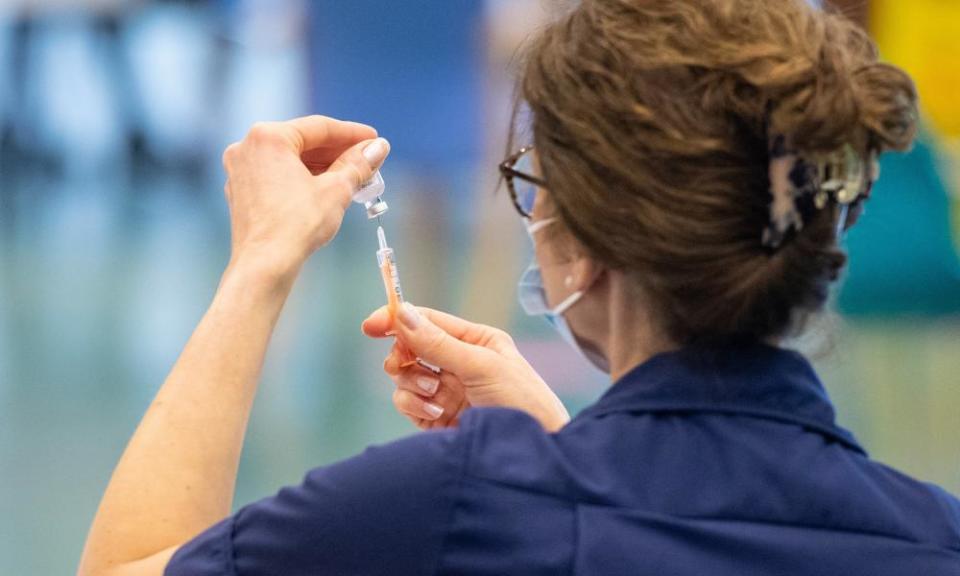Sharing Covid vaccines is in UK's best interests, say scientists

Sharing UK Covid vaccines with countries in Europe and beyond is in the UK’s best interests, scientists have said, as the row over supplies intensifies.
A dispute has sprung up between the UK and EU over the supply of Covid vaccines, after the pharmaceutical company AstraZeneca told the EU it would not be able to deliver all of the doses ordered by the end of March, due to production problems at plants on the continent. AstraZeneca said its contract with the UK meant doses could only be shipped from UK plants to Europe once the UK had received the 100m doses it had ordered.
The European health commissioner, Stella Kyriakides, hit back on Wednesday, rejecting the idea that the UK should have priority because it signed a contract with AstraZeneca before the EU.
But speaking on BBC Radio 4’s Today programme on Thursday, the Cabinet Office minister, Michael Gove, reiterated that the UK would not be sharing doses with the EU.
“The critical thing is we must make sure that the schedule that has been agreed and on which our vaccination programme has been based and planned goes ahead. It is the case that the supplies that have been planned, paid for and scheduled should continue, absolutely. There will be no interruption to that,” he said.
default
Now scientists have stressed that sharing the UK’s supply is not only a matter of ethics, but is actually in the country’s own interest.
Prof Andy Pollard, the chair of the UK’s Joint Committee on Vaccination and Immunisation, and one of the researchers behind the Oxford/AstraZeneca vaccine, told the Guardian it was a mistake to view the pandemic as simply a national problem.
Speaking in a personal capacity, he said: “We should be outward-looking in our view and work towards equitable vaccine distribution that ensures that those at greatest risk, wherever they are, have access to vaccines. This is not a British or European issue, this is a global issue, as we are all at risk from the pandemic virus, in terms of health and our economies, until all [are] protected.”
Prof John Ashton, a former regional director of public health, said one problem was the lack of global public health governance arrangements, as he called for moral leadership.
“What we have got now is something which is an unseemly row with nationalist tinges, about who should have priority and really, ethical considerations and public health considerations should inform what happens.
“I think there is a good case to be made for us using a significant part of the vaccine that we have got supplied to us for the vulnerable groups, but beyond that, if we don’t collaborate and show solidarity with the other countries that are in a bad place, or are going to get worse because of the lack of vaccine, then in the end we will suffer ourselves because the virus will continue to mutate, and it will come back in new forms here,” he said, adding that vaccines alone would not defeat the virus and that traditional public health measures including testing, tracing and isolation remained crucial.
Dr Alberto Giubilini from the Oxford Uehiro Centre for Practical Ethics at the University of Oxford said governments had a responsibility to their own citizens, and that the UK government had invested millions of UK taxpayers’ money into research on the Oxford vaccine early on. In addition, he said, the EU had to take responsibility for its delay in approving the Oxford/AstraZeneca jab.
But Giubilini backed Ashton’s proposed compromise. “We are not going to solve the pandemic locally. Prioritising the UK will produce important benefits in the short term, but not in the long term,” he said.
default
Dr Jeremy Farrar, the director of the Wellcome Trust, criticised vaccine nationalism, adding that the emergence of new variants around the world could lead to a situation in which current vaccines, treatments and tests were no longer effective.
“At the moment, vaccines are in short supply. But the new variants are an urgent warning of what is coming, which we must take incredibly seriously. It is in the national interest of all countries to bring infections down globally as much as possible,” he said, adding that all Covid vaccine doses should be donated to Covax – the WHO’s programme to pool supplies and ensure fair access.
“With limited global supply of vaccines in 2021, distributing all doses as strategically as possible is a scientific and economic imperative,” he said. “The most vulnerable everywhere, including healthcare workers, must be protected first.”
Prof Beate Kampmann, the director of the Vaccine Centre at the London School of Hygiene & Tropical Medicine, agreed.
“Vaccine nationalism is the last thing we need in the context of the pandemic, unless we plan to permanently shut up shop and stop anyone from going in and out of their country – this isn’t a world we want to live in.
“For now, the prime aim of our efforts needs to be to prevent severe illness and deaths and protect those who care for particularly vulnerable people – which includes healthcare and social workers – wherever they live. Covax has set out this strategy very clearly – protect 20% of the most vulnerable populations everywhere – and vaccine nationalism already jeopardises this aim,” Kampmann said, noting that such work would provide crucial data on how best to prevent the spread of the virus.
But Dr Michael Head, a senior research fellow in global health at the University of Southampton, said that while there was an ethical imperative for the UK to support vaccination in lower-income countries, it also had to look after its own.
“I think the main priority of the UK government has to be to its own citizens, so it’s ethically justifiable to continue to focus on a vaccine rollout here in the UK,” he said.

 Yahoo Finance
Yahoo Finance 